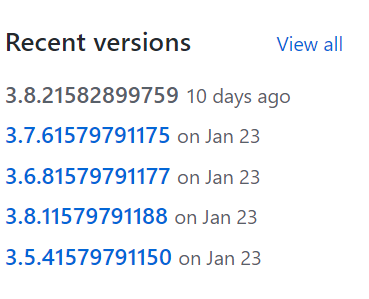Co-Authored-By: Konrad Pabjan <konradpabjan@github.com>
setup-python
This action sets up a Python environment for use in actions by:
- optionally installing a version of Python and adding to PATH. Note that this action only uses versions of Python already installed in the cache. The action will fail if no matching versions are found.
- registering problem matchers for error output
Usage
See action.yml
Basic:
steps:
- uses: actions/checkout@v2
- uses: actions/setup-python@v1
with:
python-version: '3.x' # Version range or exact version of a Python version to use, using SemVer's version range syntax
architecture: 'x64' # optional x64 or x86. Defaults to x64 if not specified
- run: python my_script.py
Matrix Testing:
jobs:
build:
runs-on: ubuntu-latest
strategy:
matrix:
python-version: [ '2.x', '3.x', 'pypy2', 'pypy3' ]
name: Python ${{ matrix.python-version }} sample
steps:
- uses: actions/checkout@v2
- name: Setup python
uses: actions/setup-python@v1
with:
python-version: ${{ matrix.python-version }}
architecture: x64
- run: python my_script.py
Exclude a specific Python version:
jobs:
build:
runs-on: ${{ matrix.os }}
strategy:
matrix:
os: [ubuntu-latest, macos-latest, windows-latest]
python-version: [2.7, 3.6, 3.7, 3.8, pypy2, pypy3]
exclude:
- os: macos-latest
python-version: 3.8
- os: windows-latest
python-version: 3.6
steps:
- uses: actions/checkout@v2
- name: Set up Python
uses: actions/setup-python@v1
with:
python-version: ${{ matrix.python-version }}
- name: Display Python version
run: python -c "import sys; print(sys.version)"
Getting started with Python + Actions
Check out our detailed guide on using Python with GitHub Actions.
Hosted Tool Cache
GitHub hosted runners have a tools cache that comes with Python + PyPy already installed. This tools cache helps speed up runs and tool setup by not requiring any new downloads. There is an environment variable called RUNNER_TOOL_CACHE on each runner that describes the location of this tools cache and there is where you will find Python and PyPy installed. setup-python works by taking a specific version of Python or PyPy in this tools cache and adding it to PATH.
| Location | |
|---|---|
| Tool Cache Directory | RUNNER_TOOL_CACHE |
| Python Tool Cache | RUNNER_TOOL_CACHE/Python/* |
| PyPy Tool Cache | RUNNER_TOOL_CACHE/PyPy/* |
GitHub virtual environments are setup in actions/virtual-environments. During the setup, the available versions of Python and PyPy are automatically downloaded, setup and documented.
Using setup-python with a self hosted runner
If you would like to use setup-python on a self-hosted runner, you will need to download all versions of Python & PyPy that you would like and setup a similar tools cache locally for your runner.
- Create an global environment variable called
AGENT_TOOLSDIRECTORYthat will point to the root directory of where you want the tools installed. The env variable is preferrably global as it must be set in the shell that will install the tools cache, along with the shell that the runner will be using.- This env variable is used internally by the runner to set the
RUNNER_TOOL_CACHEenv variable - Example for Administrator Powershell:
[System.Environment]::SetEnvironmentVariable("AGENT_TOOLSDIRECTORY", "C:\hostedtoolcache\windows", [System.EnvironmentVariableTarget]::Machine)(restart the shell afterwards)
- This env variable is used internally by the runner to set the
- Download the appropriate NPM packages from the GitHub Actions NPM registry
- Make sure to have
npminstalled, and then configure npm for use with GitHub packages - Create an empty npm project for easier installation (
npm init) in the tools cache directory. You can deletepackage.json,package.lock.jsonandnode_modulesafter all tools get installed - Before downloading a specific package, create an empty folder for the version of Python/PyPY that is being installed. If downloading Python 3.6.8 for example, create
C:\hostedtoolcache\windows\Python\3.6.8 - Once configured, download a specific package by calling
npm install. Note (if downloading a PyPy package on Windows, you will need 7zip installed along with7z.exeadded to your PATH)
- Make sure to have
- Each NPM package has multiple versions that determine the version of Python or PyPy that should be installed.
Using Python without setup-python
setup-python helps keep your dependencies explicit and ensures consistent behavior between different runners. If you use python in a shell on a GitHub hosted runner without setup-python it will default to whatever is in PATH. The default version of Python in PATH vary between runners and can change unexpectedly so we recommend you always use setup-python.
Available versions of Python
For detailed information regarding the available versions of Python that are installed see Software installed on GitHub-hosted runners
License
The scripts and documentation in this project are released under the MIT License
Contributions
Contributions are welcome! See Contributor's Guide
